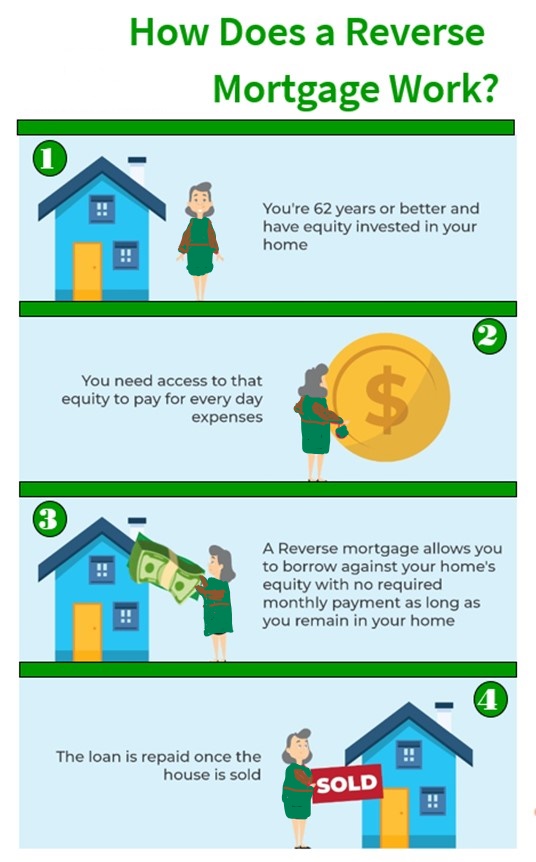What is a Reverse Mortgage?
A Reverse Mortgage, also known as a Home Equity Conversion Mortgage (HECM), is the Federal Housing Administration’s (FHA) mortgage program. It was created in 1989 so that homeowners that are at least 62 years are able to stay in their home while withdrawing some equity. The borrower chooses how to withdraw their funds, whether in a fixed monthly amount or a line of credit or a combination of both.
The uniqueness of the HECM
✓ No monthly mortgage payments
✓ Access to funds with no financial burden
✓ Retain the title (ownership) of your home
✓ Refinance clause (allows you to take advantage of the market)
It is a mortgage loan based on:
-Home’s value
-Minimum one borrower who is at least 62 years with title to home
-Home is primary residence
-Current interest rate
-Ability to pay property taxes and insurance annually
-No credit score requirement (overall history is reviewed)
The loan is ultimately repaid when you or the last surviving borrower (or non-borrowing spouse passes) away through selling the property or refinancing by your heir(s).
The refinance provision in the program allows a client to take advantage of today’s home values, the lower fixed rate programs and guidelines to get more out of their Reverse Mortgage.
In order to refinance, an existing HECM, there must be a net tangible benefit for you.
To see if this program is right for you, email [email protected] or call 615-293-5804 for a free consultation. In order to determine your benefit, please have your mortgage statement available.

Do I still pay property taxes and homeowner’s insurance?
Yes. Although the HECM doesn’t require monthly mortgage payments, you are still required to keep making timely property tax and homeowner’s insurance premium payments just as you would do with a traditional mortgage.
Do I still own my home or does the bank?
You retain title and ownership of the home just as you would with a traditional mortgage. The only time a borrower could risk losing ownership of the home would be due to a loan default for failure to pay property taxes and homeowner’s insurance or not maintaining the property.
Does my home have to be paid off?
No. You can have an existing mortgage balance and as long as the proceeds of the HECM are sufficient to pay off the existing mortgage, closing costs and fees.
Is my property eligible for the HECM?
HECM is for single-family, 2-4 unit multi-family, planned unit developments (PUD) and FHA approved condominiums. In addition, the property must be the borrower’s primary residence.
How much money am I eligible for?
The amount of your loan proceeds vary based on the age(s) of the borrower(s), the current interest rate, the home’s appraised value, and the HECM loan products chosen. You will receive an estimate showing you possible loan proceeds for several loan programs.
Can I buy a home with the HECM?
Yes. FHA allows for the purchase of a home in one transaction with the HECM purchase programs. You can use the proceeds from the sale of your previous home or other cash for your down payment and finance the balance with the HECM. Your down payment is determined by the home’s purchase value less available HECM proceeds and loan costs. Even better you don’t have any monthly mortgage payments for your new home!
How can I get my cash proceeds?
The HECM has several flexible payout options including a lump payout, partial lump sum payout, monthly installment payouts, a line of credit, or a combination of these options. Your access to proceeds is limited in the first year, but you will have access to the remaining funds after that time. The unused funds in the line of credit are charged interest until used and your available credit line may actually increase each month when unused.
When is the loan repaid or due?
Your HECM loan is not due and payable until one of the following occurs:
1- the last surviving borrower (or non-borrowing spouse) has passed away
2- the home is no longer the primary residence of at least of the borrowers (or nonborrowing spouse)
3- an absence of both borrowers for a period longer than 12 months
4- the borrowers fail to pay property taxes or homeowner’s insurance as required
5- the property is not maintained and deteriorates to a condition deemed unreasonable.

